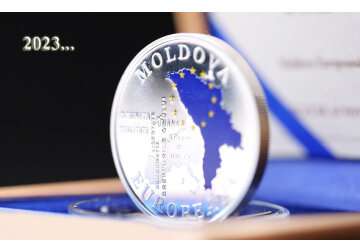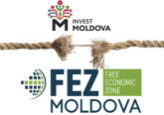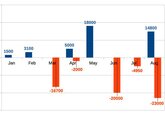
The Year 2023: In order to get somewhere, you have to run at least twice as fast
InfoMarket Agency Commentary
Unlike the previous year, when all successes and failures could still be blamed on war, pandemic and energy crisis, in 2023 we blamed mostly ourselves. Although the geopolitical vector predetermined a series of events in the country and allowed us to attract quite specific amounts of aid and support from external partners, it was not easy to achieve real results in Moldova - both for the authorities, business and citizens. As in Lewis Carroll's famous story about Alice in Wonderland, "it takes all the running you can do, to keep in the same place, and if you want to get somewhere else, you must run at least twice as fast as that!" InfoMarket Agency, by tradition, presents a subjective summary of important events and trends of the outgoing year.
Oh yes, even closer to the EU. Moldova has risen one more step on the way to joining the "European" family: on November 8, 2023, within the framework of the EU enlargement package, the European Commission recommended to start accession negotiations, and already in December European leaders at the summit in the European Council announced the opening of the negotiation process with Moldova and Ukraine. Many called this event historic, and some, to say the least, are skeptical of the very idea of European integration. But the event is quite natural and expected, because in 2022 Moldova received the status of candidate for EU accession. In June this year, at the summit of the European Political Community in Bulboaca, about 50 leaders of European countries confirmed their readiness to support Moldova on its way to the EU, and a series of official visits at the highest level reinforced these promises. Of course, the process will take a long time, because we are only halfway there. Next, the country will move along the National Action Plan on Moldova's accession to the EU for 2024-2027, which is 35 directions, divided into 6 thematic blocks. And, before being located "under the EU stars", Moldova should prepare to implement EU laws and standards, and each of the 27 EU countries should confirm that all requirements are met. The start of negotiations will attract even more funding. In 2022, the EU provided Moldova with more than 800 million euros to overcome the energy crisis, strengthen economic resilience, support in strategic areas, while this year the total amount of macro-financial assistance to Moldova is 295 million euros, of which 220 million euros are loans and 75 million euros are grants. This amount includes an additional financing of 145 million euros, approved by the European Parliament and the Council in June 2023.
The resignation of the National Bank Governor and the appointment of a new head of the regulator through a "simplified procedure". The news was not so much the fact that the Governor of the National Bank (NBM) Octavian Armasu was dismissed, but the way it was done and the way the Parliament, skipping a whole chain of legal procedures, immediately appointed a new Governor of the NBM. And while even the opposition voted for Armasu's dismissal (81 votes in total), the appointment of the new Governor of the National Bank of Moldova took place only due to the MPs from the ruling party. The official reason for the dismissal in the Parliament was the insufficient and inefficient activity of the NBM in terms of auditing the processes and persons involved in the "billion theft" case, inefficient cooperation of the NBM with law enforcement bodies in order to investigate and recover the funds stolen from the banking system within the "billion theft" case. Interestingly, Armasu's dismissal came a couple of weeks after the IMF on December 7, 2023, approved a new tranche of about $95 million under the existing financing program and approved for Moldova a new facility called the Resilience and Sustainability Facility (RSF) of about $173 million. By the way, the IMF, which closely monitors the National Bank's activities and respect for its independence, issued a statement, neatly expressing bewilderment at the hasty decision of the Parliament. Armasu had served as Governor of the National Bank of Moldova since November 30, 2018. The new head of the NBM is Anca Dragu, a Romanian citizen who obtained Moldovan citizenship the day before her appointment. She has extensive experience in the banking and finance sector: she worked at the Romanian National Bank, at the IMF, and was the Romanian Minister of Public Finance.
Progress in digitalization and debureaucratization - reforms with an eye on Estonia. The ministry of Dumitru Alaiba, responsible for both sectors, reported that the share of digitized public services has increased to 50% by the end of the year, and from next year the results of the reporting optimization reform will be visible - 15 reports will be excluded from the 92 reports requested by the State Tax Service (STS) and the National Bureau of Statistics, 9 more will be digitized, and 14 will be optimized. Deputy Prime Minister does not hide the fact that he is oriented on the experience of Estonia, where the entrepreneur submits one report annually. In just one year, Moldova has launched six packages to reduce bureaucracy, which will save businesses up to 1 billion lei per year (50 million euros) and more than 6 million working hours per year. Simplification of the Labor Code, abolition of the "blue" medical book, the book of complaints and the register of cash registers (though only for companies that are connected to the STS electronic sales system (MEV)), and others. Unpopular but finally implemented was the so-called "reform of patents" for retail trade. Small retailers were offered to switch to a new form of organization: SRL (LLC) or independent activity of an individual - a form of self-employment with minimal reporting, but mandatory use of cash registers connected to MEV. About 90% of former trade patent holders ended up re-registering. Starting from July 1, thanks to this reform, it was possible to bring into legal circulation 325 million lei - this is the volume of sales registered by "independent" entrepreneurs who issued more than 2 million cash receipts. At the same time, the implementation of business support programs continued. Among the new ones is the "373" program launched in June, through which businesses can get low-interest loans, partially covered by the state. By the end of the year, the announced amount of investments under this program amounted to more than 650 million lei, and its participants increased the number of jobs by more than 20%. Projects to improve the infrastructure of towns and villages are also ongoing, and the second program "European Village" has been launched.
Fast but slow, forward but a little backward. This year, for the first time in many years, the tax and customs policy for next year was not only developed but also approved on time. But it's inaccurate. Towards the end of the year, a new bill suddenly appeared, mostly with changes in the customs area. The fact is that on January 1, 2024 a new Customs Code takes effect. Approved back in August 2022, it was supposed to take effect on January 1, 2023, then on July 1, then on January 1 next year. And even the latest amendments globally do not ensure readiness to apply the new Customs Code in practice, and businesses still have a lot of questions regarding the new law. They concern many procedures, state support schemes, guarantees to investors regarding tax and customs regimes in free economic zones (FEZ), etc. They did not postpone the date of entry into force of the document, and almost certainly 2024 will start with slippages. Meanwhile, the development of the concept of the new Tax Code has begun...
Minus one FEZ, reorganization of state enterprises and state institutions. This year the Otaci-Business Production Park, established in 1998 for a 25-year term, was liquidated - the government did not extend the inefficient project and warned that other small free zones, which failed to realize the tasks assigned to them, are next in line. At the same time, the tax regime and the term of activity of one of the most successful projects in the country - Moldova IT Park - were extended, although the tax guarantees will expire a couple of years earlier (2035) than the Park's term of activity (2037). When approving this project, the authorities made a compromise - initially it was proposed to toughen the tax regime for IT Park residents, but after lengthy negotiations this idea was abandoned. Instead, they managed to introduce two new types of activities - export-oriented call-centers and contact centers will be able to work in the IT-park, although the BPO (Business Process Outsourcing) sphere is only indirectly related to information technologies. We also observed a series of reorganizations of state agencies, such as the State Labor Inspectorate, social assistance structures, the State Inspectorate for Financial Control, the Agency for Land Relations and Cadastre, etc. At the same time, the merger of two important hospitals in the capital started with scandal and protests, the optimization of universities continued - the State University of Physical Education and Sport will become part of the State University, and the authorities have completely dissociated themselves from the university in Taraclia, handing it over to the Bulgarian authorities.
The local elections emphasized the fragmentation in society. The banned SOR party, like the Phoenix bird, revived under the name "Chance" (ȘANSĂ) to run in the local elections, but was not given a chance, being kicked out of the race almost on the eve of election day. As a result, candidates from this political formation were not able to participate in the elections, except those who were not directly related to the fugitive oligarch Ilan Shor, although they had his support. In contrast to the "Diaspora" on which the central authorities rely in parliamentary and presidential elections, ordinary citizens voted as they could - on the principle of "against the ruling authorities", under the influence of manipulation or for a bribe. And the results of this rehearsal for the big elections showed that the ruling majority in some regions has a rather fragile position. Under the influence of pro-Kremlin propaganda (official version) and by selling their votes (also official version) citizens vote compromising the chosen geopolitical course. This means that all the achievements in the field of European integration may, if not collapse, then be greatly shaken, especially in some regions, first of all in ATU Gagauzia. In order to finally consolidate the course on European integration, a referendum can now legally be held in Moldova. This will probably happen already during the presidential elections, which are scheduled for the fall of 2024.
Chisinau International Airport has returned under state control and changed its code.
Nevertheless, there have already been statements that a new investor is being sought for the airport (the word "concession" is already unpopular). But immediately after the announcement of the return of the airport under state management, the low-cost carrier WizzAir left Chisinau, citing security problems. This allowed other operators to raise ticket prices, so passengers were forced to use the services of Iasi airport, which is urgently building a third terminal to accommodate the influx of passengers. By the end of the year, WizzAir slowly began to make a comeback, bringing back flights to Italy and the UK. This year, the authorities have been actively negotiating to expand the geography of flights and attract new operators. Israir (Tel Aviv), Azerbaijan Airlines (Baku), Aegean Airlines (Athens) are entering the market, and Air Baltic (Riga) will start flights in spring. Some "old-timers" doubled their flights and expanded the geography of flights. Negotiations were underway with another popular in Europe (including Romania) low-cost carrier RyanAir. But so far the prices for tickets from Chisinau to many destinations are significantly higher than those of competitors flying from Iasi. Also, the international code of the airport will change from KIV to RMO. Experts recommend, just in case, after changing the code, fly without luggage for some time until this change occurs at all airports around the world.
The economy continues to be vulnerable. No significant GDP growth was expected this year, but the initially projected figure of +2.5% was reduced by the Ministry of Economic Development and Digitalization to +2%, and recently the head of the ministry, Dumitru Alaiba, said that growth will be even more modest +1.5%, albeit with the hope of a small revenge in the coming years. The forecasts of international institutions and experts are a bit more optimistic. The independent think tank Expert Grup, for example, forecasts a 3.3% increase in GDP in 2023 and, to a large extent, this will be due to compensatory growth in the agricultural sector (in 2022 the decline was about 30%) - without the contribution of this sector, the economy would practically stagnate. In addition to external factors and uncertainty in the region, Moldova continues to have weak domestic and external demand and reduced investment activity. This is despite the fact that the inflow of Ukrainian refugees and relocants supported consumer demand and some segments of the economy. Systemic problems of the economy (weak competitiveness, low technological sophistication of enterprises, production of goods and services with low added value, labor shortage, etc.) also hinder development. All these difficulties occur against the background of weak and unsystematic state administration.
High inflation and increasing poverty of the population - the effects of the difficult 2022 caught up with the economy in 2023 as well. In 2022, amid shocks related to the energy crisis and inflation, as well as the war in Ukraine, the absolute poverty rate in Moldova rose to 31.1%. This is the highest absolute poverty rate in Moldova since 2014 (the lowest was 23% in 2018). The government's efforts to support the population through the expansion of social assistance programs and compensation of energy costs could not absorb the record inflation growth, and the nominal growth of wages and pensions in real terms was decreasing. There have been also noticed a downward trend in remittances. The average annual inflation rate in 2023 is forecasted at 13.6% and next year, inflation is expected to return to the limits of the corridor set by the National Bank - about 5%. But this indicates only a reduction in the rate of price growth, not a reduction in prices themselves. Therefore, the issue of supporting the vulnerable population is likely to remain in the focus of authorities’ attention. In the energy sector, by the way, the situation has stabilized this year - so far only in terms of stability and diversification of the geography of gas and energy supplies. This year, the National Energy Regulatory Agency (ANRE) has both increased and decreased the tariffs for electricity, gas and heat, which soared last year, but the return to the pre-historic level of tariffs looks like a fantasy. The exception is perhaps the NordGaz company, which promised to supply gas at 10 lei per cubic meter to consumers in several localities headed by opposition mayors. But ANRE suspended its license, so it remains a mystery how feasible the company’s promises could be.
It turned out that the situation is no longer an emergency. After nearly 4 years of running the country in emergency mode, we enter the New Year 2024 exempt from it. Truth be told, though, it's hard to grasp what has changed from this spring or summer. The Emergency Situations Commission will no longer be able to make urgent and not always reasoned decisions. The latter, for example, is the belated result of a compromise with agrarians - licensing of imports of wheat, corn and sunflower seeds was introduced for three months in order to maintain economically stable prices on the domestic market. The state of emergency also allowed the authorities to implement a whole range of measures to "counter disinformation" - from blocking websites that spread false information to the temporary suspension of licenses of more than ten TV channels. However, as it turned out, as part of the policy of de-oligarchization, the licenses of 8 TV channels will not be renewed even after the end of the state of emergency - the investments of their owners are recognized as significant for state security. Whether this is an abuse of power is a question. At the same time, programs to support fair and independent media and to develop freedom of speech are being launched in the country with the financial support of donors. While as for the rest, from December 31, all restrictions and rules adopted during the state of emergency are abolished or the basic laws become effective. For example, in the HoReCa sector, a new standard VAT rate of 8% instead of 12% (during the Emergency state, the rate of 6% was in effect) will be applied from December 31, 2023.
The Year 2024 will be interesting and hot in every sense of the word. New laws and restrictions will take effect, but new opportunities will also emerge, progress in the justice sector is expected in the development of the real economy. Follow the events with InfoMarket agency, a reliable and trustworthy source of news.
InfoMarket Agency wishes everyone good luck, optimism, health, accomplished plans and good news in 2024!







